'The 2019 election and the run-up to it will certainly see bots being deployed in large numbers on all sides.'
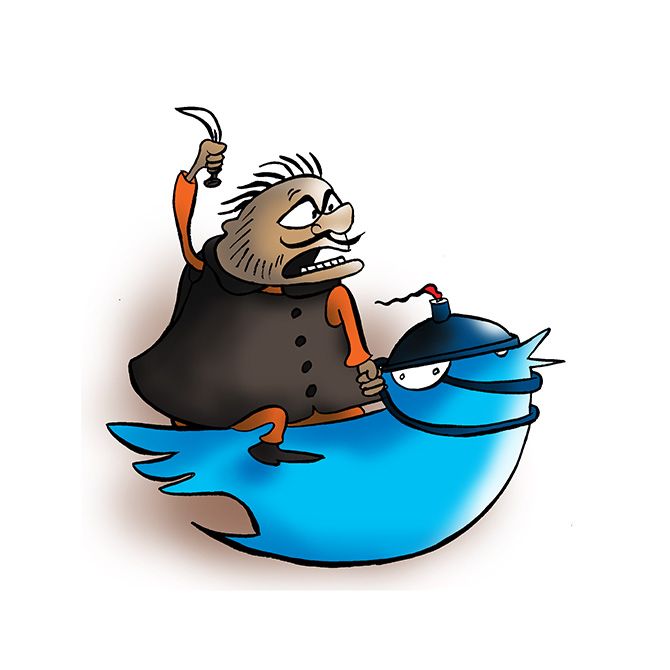
Illustration: Uttam Ghosh/Rediff.com
On Friday, Devangshu Datta explained in the first part of this feature how 'any 21st-century political campaign will involve a lot of jockeying for social media territory.'
'The higher the profile of the campaign,' he pointed out, 'the more likely it is to draw freelancers.'
In the concluding segment of his feature, Devangshu looks at the ongoing Battle of the Bots between different political groups in India.
The Indian Twittersphere has seen similar use of automation since at least 2013.
The Anna Hazare agitation, right-wing friends of the BJP and the BJP itself have all used social media with consummate skill.
Hashtags have been trended by using a combination of verified high-profile tweeters to make the original tweets followed with many automated accounts spewing out coordinated retweets.
Quite often the content has been spurious. Photos sourced from Bangladesh have been passed off as communal incidents in Kerala; the Ahmedabad riverfront has been Photoshopped, quotes from mediapersons have been selectively spliced together to create a misleading impression.
In addition to propagating this sort of fake news, Twitter has also been used cleverly to build Brand Modi and inversely, to brand Rahul Gandhi as incompetent, using the tools of satire and irony.
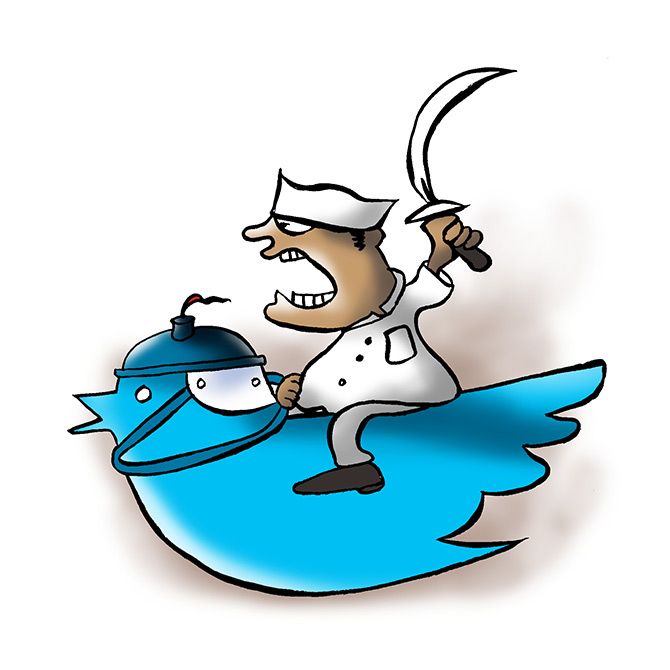
Illustration: Uttam Ghosh/Rediff.com
The Congress is only beginning to catch up. It has lately started to make an impact by using catchy songs like the Vikas Gando Thayo Chey (Development has gone mad) lampoon in Gujarati.
Bots have also been used to relentlessly troll political opponents and to troll mediapersons who are perceived to be unsympathetic.
This is often done in the vilest of terms with abuse, rape threats and doxing of information thrown in.
In at least one case, Delhi-based journalist Swati Chaturvedi was trolled by a tsunami of right-wing bots emanating out of South Thailand.
Of course, trolling is not the sole preserve of political tweeters.
Movie critics are trolled by fans of movie stars.
Sports fans troll sports journalists.
The technology is agnostic. Bots are also used to propagate useful information and to run FAQs for prominent corporate brands.
Entertainment channels release their programmes using bots.
General knowledge questions are answered by bots.
Bots flag changes in Wikipedia crowd-sourced edits of sensitive subjects.
But nobody has yet figured out a way of nailing down fake news and driving it off social media.
Truth will certainly come out and every fake story is usually rapidly debunked by credible sources.
Indeed, there is now a cottage industry of tweeters who make it their business to track down and debunk fake news on social media.
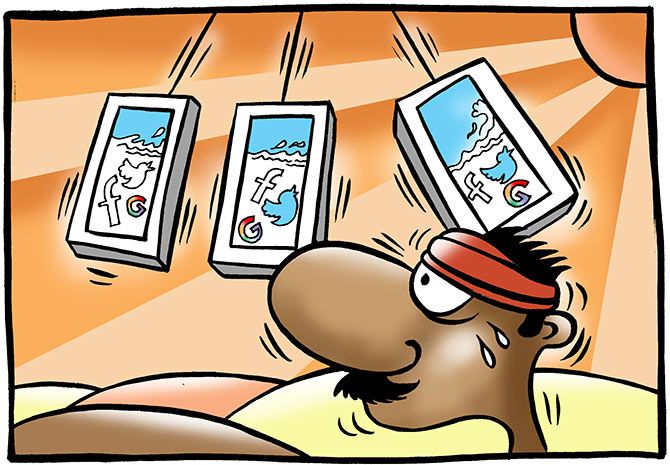
Illustration: Uttam Ghosh/Rediff.com
Pratik Sinha, for example, runs Alt News that is dedicated to dissecting and debunking fake news and identifying fake accounts.
But no matter how often a story is debunked, the social media bubble ensures that the fake narrative also stays alive and some people continue to believe it.
Indeed, forget about fake news, nobody has figured out a fool-proof way to identify fake accounts for certain.
This is considered so important that the US Defense Advanced Research Projects Agency (the same agency that funded the research that led to the Internet) funded the 'Twitter Bot Detection Challenge' inviting researchers to develop methods to identify 'influence bots'.
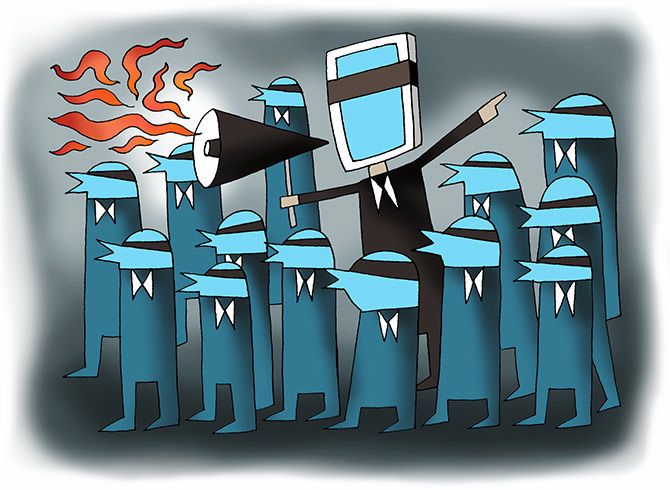
Illustration: Uttam Ghosh/Rediff.com
The battle of the bots will continue.
The 2019 election and the run-up to it will certainly see bots being deployed in large numbers on all sides and the freelancers will pile on as well.
So the next time you see a tweet being retweeted by 20,000 people, be aware that it might just be a couple of geeky teenagers doing their thing.
How Twitter bots work
A Twitter bot is an automated account. It can tweet, retweet, like, follow, unfollow, or direct message.
Bots are used for broadcasting helpful information, auto generating content, et cetera.
They are also used for spamming and spreading fake news and propaganda and trying to trend hashtags by increasing the volume of tweets.
Sometimes they are hired by users who just wish to show a high follower count.
Multiple bots -- a panel -- can be controlled by one person using software that's easily available on the dark web.
About 25 per cent of tweets are estimated to be created on bots, and Twitter submitted an estimate in 2016 that about 8.5 per cent of all accounts are bots.
Most bots have few followers, but clever manipulation can increase the follower count for bots by picking the right accounts to follow and tweeting on hot button subjects.
While many bots perform legitimate tasks such as flagging Wikipedia edits or promoting brands, there is increasing concern about the way these are used to promote fake news and propaganda.
Bots were extensively used during the Russia-Ukraine dispute and also during the 2016 Brexit and US presidential election campaigns.
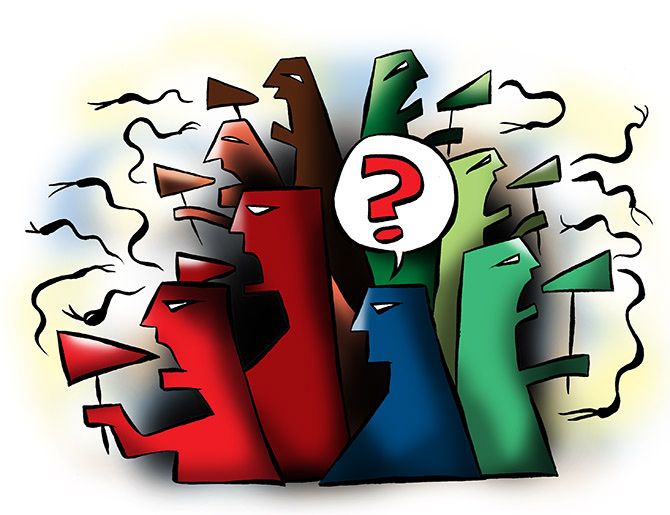
Illustration: Uttam Ghosh/Rediff.com
Most high-visibility Indian Twitter accounts, including prominent politicians, have large numbers of bot followers.
The 2014 Lok Sabha election saw a strong social media campaign crafted by the Bharatiya Janata Party that included the use of many bots.
There are often determined efforts to trend hashtags on Indian Twitter by using bots. There are accusations and counter-accusations by most political parties about the use of bots and there is apparent evidence in many cases.
There have been many attempts to find fool-proof methods of flagging bots. Some of these are purely technical.
Bots may tweet in inhumanly high volumes -- sometimes they can churn out thousands of tweets in a day.
Typically, bots panels will tweet and retweet the same content in unison as well. But clever 'bot managers' can also disguise themselves as legitimate accounts.
The latest tool for bot detection is itself a bot called @Probabot that identifies and analyses political tweets using the Botometer, a tool developed by the Indiana University Network Science Institute and the Centre for Complex Networks and Systems Research.
This looks at the content of tweets, who is tagged, and how often, and who else is in their network.












 © 2025
© 2025